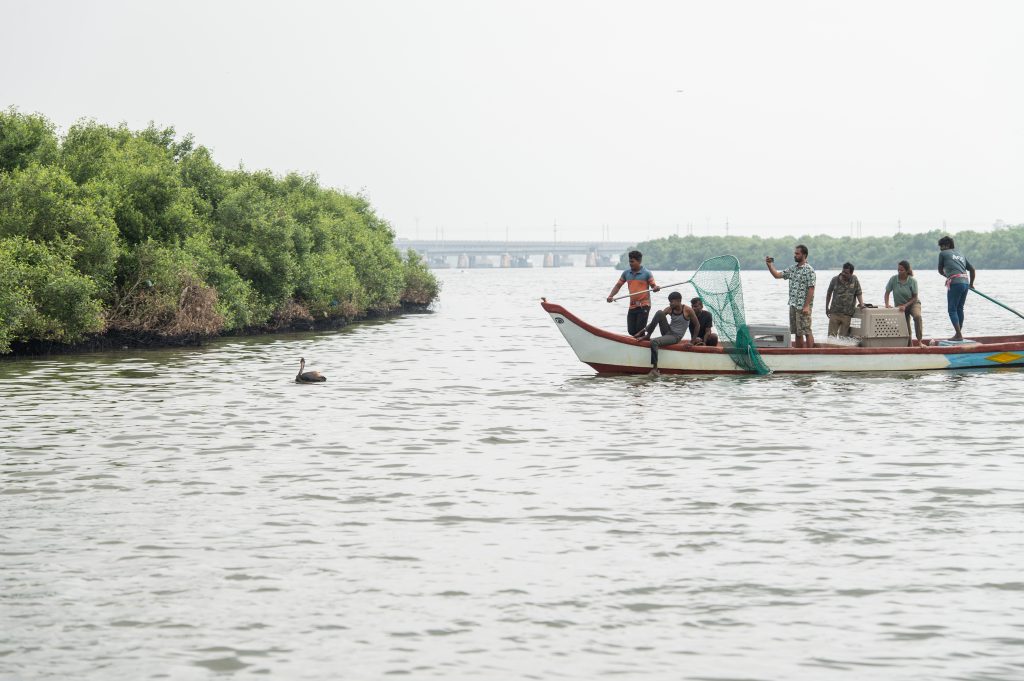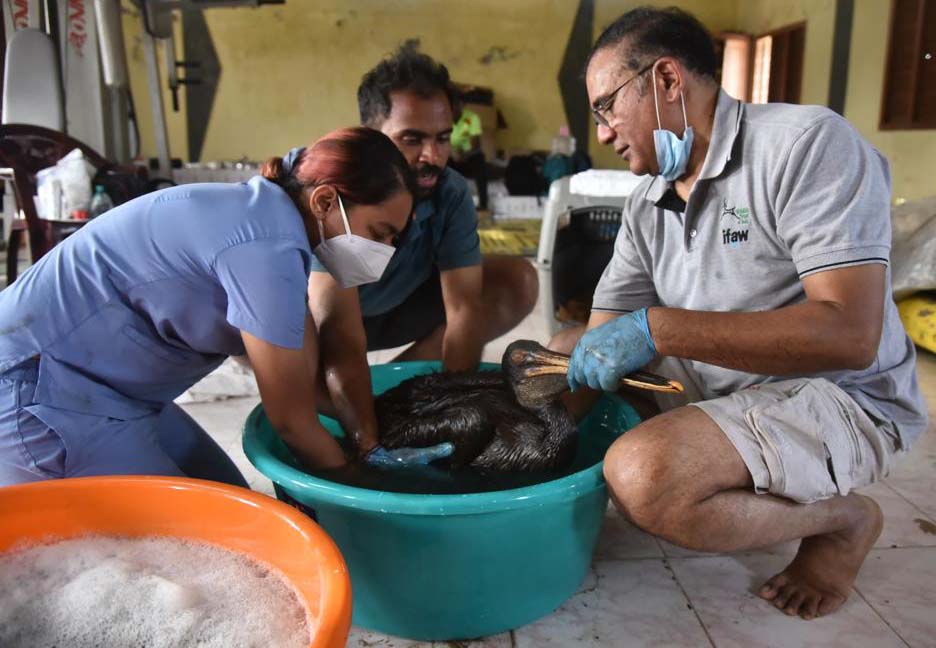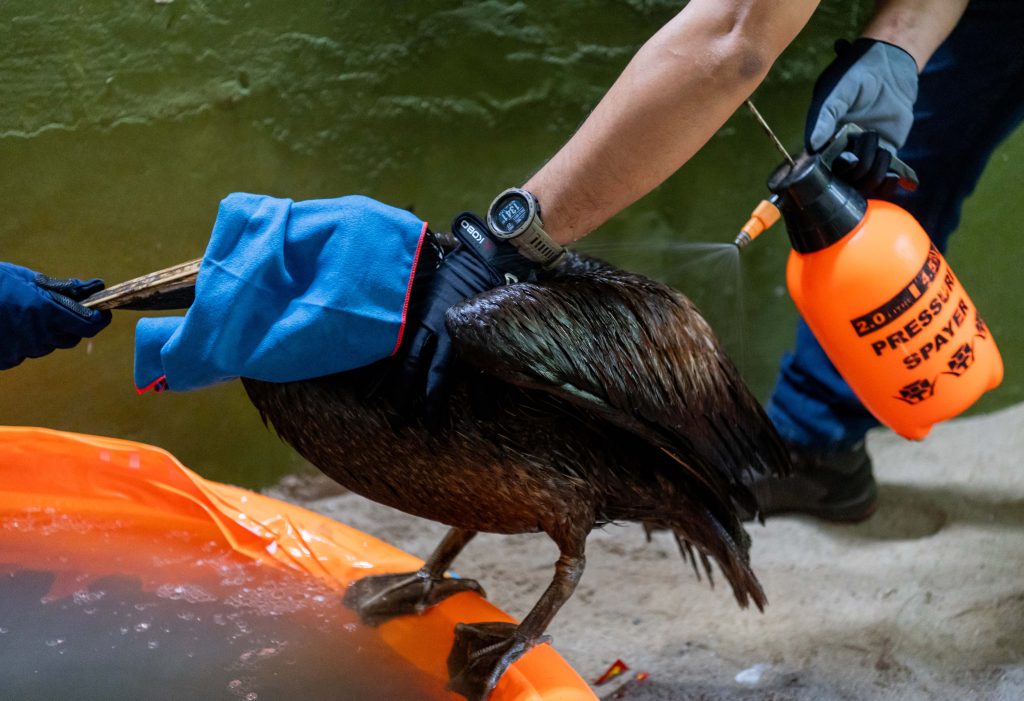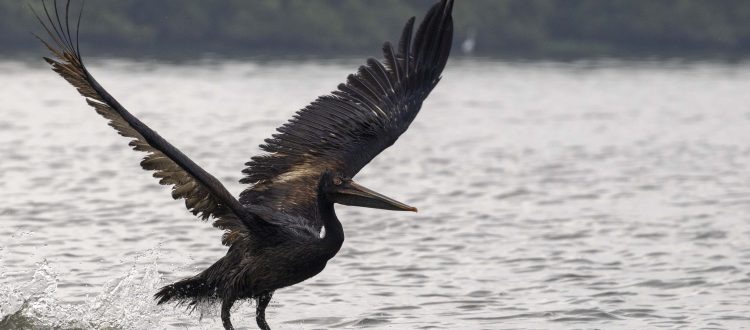Oil spill disaster at Ennore estuary: Nine spot-billed pelicans under rehabilitation
Ennore, 4th January, 2023: IFAW-WTI team has been on-ground, providing technical expertise to the Tamil Nadu Forest Department and Besant Memorial Animal Dispensary (BMAD), on rehabilitation and veterinary care of spot-billed pelicans rescued from the Ennore oil leak disaster. As of today, 9 spot-billed pelicans have been rescued by the team and are currently under care.
Spot-billed pelicans are listed as “Near Threatened” under the IUCN Red List of species. They are also only species of pelicans known to breed in India. However, over the past month, their population along the Chennai coast has been severely affected by the recent oil spill, an aftermath of the cyclone Michaung.

Spot billed pelican drenched in oil being rescued in the Encore Creek, Chennai | Photograph by Shantanu Krishnan
Reported first, on the 4th of December, the oil spill, from the Chennai Petroleum Corporation Limited (CPCL) had spread quickly along the Kosasthalaiyar river, the Ennore Creek and into the sea. The floods, resulting from the cyclone, aided in the quick spread, causing a serious threat to life in the backwaters, both wildlife and the fishermen. Tamil Nadu government had promptly acted to contain the damage. “Close to 900 personnel, including trained sea cleaning agencies and local fishermen, were deployed to remove 105.82 kiloliters of oily water and 393.5 tonnes of oily sludge from the Enoore Creek” as per an official statement by Supriya Sahu, Additional Chief Secretary of the Environment, Climate Change, and Forest Department.
Emergency Relief Network (ERN) personnel, trained in bird rescue, treatment and rehabilitation were deployed on ground on the 21st of December. Since then, the team has been working with responders from BMAD to rescue affected birds, after which they are being promptly transferred to the dispensary and the Guindy Children Park for care and treatment.

Spot-billed pelican under treatment at Besant Memorial Animal Dispensary | Photograph by BMAD
“Once a bird is captured, it is given hydration and basic cleaning of orifices is done on the field. On being brought to the temporary enclosure, they are thoroughly cleaned using vegetable oil and liquid detergents capable of removing oil”, says Rudra Mahapatra, IFAW-WTI ERN responder. The birds are initially tube-fed with fish broth before they start feeding on their own on live and dead fishes. The team has installed inflatable water tubs on sandy bed for the birds inside the enclosures. There is also a provision of branches for them to perch upon. UV lamps and sometimes blowers are used to provide warmth to the birds when required. The IFAW-WTI team has also been assisting on the husbandry of the birds under care.
“Pelicans float the surface and dive to catch fishes, and this has been the reason why they have been the most affected species in this event. The team also identified black-winged stilts and painted storks with oil sludge covering their legs. Other diving birds like cormorants and darters too have been affected”, adds Mr. Mahapatra. Carcasses of cormorants and pelicans have also been recovered from the creek in the past few weeks. There has been a high mortality of fishes as well.

Washing waste oil off a spot-billed pelican | Photograph by Shantanu Krishnan
The team, comprising forest department staff, rescuers from BMAD and WTI has been on the lookout for more affected birds across the Ennore creek. “There are at least 20-25 more pelicans that need to be rescued and attended to. Once they are cleansed of oil and oil debris, they should be made fit to survive in the wild. The process is going to take some time.” says Dr. NVK Ashraf, Chief Veterinarian with Wildlife Trust of India (WTI).
Emergency Relief Network (ERN) was launched in 2004 by Wildlife Trust of India (WTI) in partnership with the International Fund for Animal Welfare (IFAW). ERN acts as a platform for expert and amateur rehabilitators and those working for wildlife conservation, including wildlife veterinarians, forest officials, biologists and others, to exchange, share and contribute their knowledge and professional skills in the care for animals in crisis and distress.









